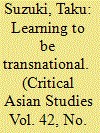| Srl | Item |
| 1 |
ID:
094003


|
|
|
|
|
| Publication |
2010.
|
| Summary/Abstract |
During their more than 100-year-long presence in Peru, Japanese descendants (Nikkei) have been linguistically integrated into Peruvian society. The portion of the population that speaks Japanese in daily life has been decreasing dramatically, and the majority of younger Nikkei typically grow up speaking mainly Spanish, mixed with a specific Japanese lexicon that has been transmitted intergenerationally within families. To prevent the complete loss of ancestral language and cultural traits, private all-day elementary and secondary schools, founded and run by the Nikkei, have been offering additional Japanese language educational programs. Drawing from an ethnographic study at one such Nikkei-sponsored secondary school in Lima, this article portrays the students' inconsistent and ambiguous attitudes toward learning Japanese as their heritage. More specifically, the article focuses on returnee students from Japan, a recently emerged diaspora group of youngsters who have spent time in Japan as emigrants and then returned to resettle in Peru. The article examines the returnees' negotiations with the language teachers regarding what is considered to be "proper" or "standard" Japanese. Classroom observations and interviews with both teachers and students demonstrate how contested the "heritage" of heritage language education is-defined as it is through social, economic, and political positions and interests of participants in the educational process. The study also shows how the institutionalized heritage language education at school sometimes results in encouraging the students to "dis-inherit" what they have learned outside school: this may relate to their family's social status in their ancestral country.
|
|
|
|
|
|
|
|
|
|
|
|
|
|
|
|
| 2 |
ID:
094001


|
|
|
|
|
| Publication |
2010.
|
| Summary/Abstract |
Scholars and practitioners of heritage language education commonly hold two assumptions about heritage language: first, that heritage language is an official national language of a nation-state from which group originally migrated; and second, that heritage language is a vulnerable language on the verge of getting swept away by the national language of the nation-state of a migrant's current residence. This article questions these two assumptions by examining Japanese language education and speech practices among Okinawan-Bolivians in a rural agricultural community called Colonia Okinawa. Okinawan-Bolivians' heritage language education and speech practices suggest that immigrants who were marginalized in the nation-states of their migratory/ancestral origin, like Okinawans, consciously transform their linguistic heritage from a sub-national one to a national one in order to gain socioeconomic advantages in their migratory destination. Furthermore, when immigrant community leaders deem the international standing of the country of their migratory origin higher than their host country's status, such as Okinawan- Bolivian leaders in Colonia Okinawa, they regard heritage language education as a crucial means to maintain their community members' political, economic, and symbolic powers over other local residents. By ethnographically portraying the ways in which Japanese is taught and spoken in Colonia Okinawa, this article highlights the shifting scales and locations of the immigrant community's "ancestral homeland" and draws attention to the multiple meanings of the language the community designates as its "heritage."
|
|
|
|
|
|
|
|
|
|
|
|
|
|
|
|